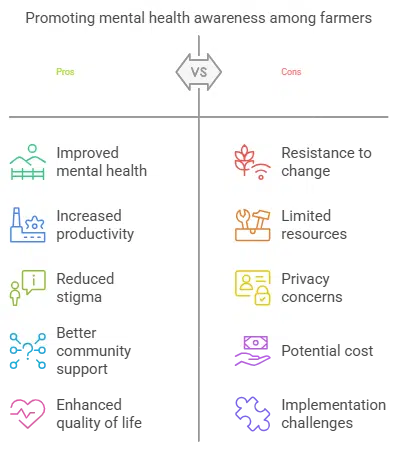Farming is the backbone of Australia’s economy and culture, but it comes with unique challenges that can heavily impact mental health.
From unpredictable weather conditions to financial stress and social isolation, Australian farmers face numerous pressures that affect their well-being.
Mental health awareness among Australian farmers is not just a personal necessity but a critical factor in sustaining the agricultural sector. According to recent statistics, rural communities experience higher rates of mental health issues, yet they have limited access to mental health services.
Raising awareness and adopting best practices can create a healthier, more resilient farming community.
Best Practices for Promoting Mental Health Awareness Among Australian Farmers
1. Educate Farmers on Mental Health Basics
Key Benefits of Mental Health Education
Mental health education provides a foundation for understanding and addressing mental health challenges. By equipping farmers with knowledge, communities can:
- Reduce stigma around mental health, fostering acceptance and understanding.
- Empower individuals to identify early signs of mental health issues in themselves and others.
- Encourage proactive behaviors for seeking help and supporting peers.
How to Implement Educational Programs
Effective educational programs can make a significant difference. Consider these steps:
- Partner with local health organizations to deliver targeted mental health training.
- Offer interactive workshops, webinars, and accessible printed materials focused on real-life farming scenarios.
- Provide incentives such as government subsidies or recognition to encourage participation.
| Approach | Benefits | Examples |
| Workshops | Interactive learning | Mental Health First Aid for Farmers |
| Webinars | Remote accessibility | Live Q&A with psychologists |
| Materials | Ongoing reference | “Mental Health in Farming” guidebook |
2. Build Strong Community Networks
Role of Community in Mental Health
Social isolation is a common issue among farmers. Building strong community networks offers critical emotional and practical support. When communities come together, mental health awareness among Australian farmers becomes more sustainable.
Steps to Strengthen Community Bonds
- Organize local events, such as farming expos, potluck dinners, and mental health awareness days, to encourage interaction.
- Utilize social media and apps to share resources and maintain communication within rural areas.
- Establish peer support groups where farmers can openly discuss challenges and share solutions.
| Activity | Outcome | Example |
| Community events | Stronger bonds | “Farmers’ Mental Wellness Fair” |
| Online forums | Anonymous sharing | Rural Wellbeing Network |
| Peer groups | Shared experiences | Local farmer support circles |
3. Encourage Open Conversations About Mental Health
Breaking the Silence
Open discussions are vital for reducing stigma and encouraging farmers to seek help. Mental health awareness among Australian farmers can flourish when individuals feel safe sharing their experiences.
Tools for Facilitating Conversations
Practical tools and approaches can create an environment where farmers feel supported:
- Provide mental health toolkits designed for farming families to initiate conversations.
- Introduce apps and forums for anonymous sharing, such as “Talk It Out” platforms.
- Promote widely known helplines such as Lifeline Australia (13 11 14) and Beyond Blue (1300 22 4636).
| Resource | Purpose | Accessibility |
| Toolkits | Conversation starter | Distributed at community events |
| Apps | Safe sharing space | Available on mobile devices |
| Helplines | Immediate support | 24/7 availability |
4. Promote Work-Life Balance
Signs of Work-Life Imbalance in Farming
Farmers often face relentless schedules and high stress, leading to imbalances. Indicators of work-life imbalance include:
- Persistent fatigue and irritability.
- Neglected personal relationships and social isolation.
- Physical health symptoms such as poor sleep and chronic pain.
Practical Tips for Achieving Balance
To promote balance, farmers can adopt practical strategies:
- Use time management tools such as apps and planners to prioritize tasks effectively.
- Schedule leisure activities to reconnect with family and friends.
- Develop hobbies outside of farming to diversify focus and improve mental well-being.
| Strategy | Benefit | Example |
| Time management | Reduced stress | Farm Diary app |
| Leisure time | Improved relationships | Family movie night |
| Hobbies | Mental rejuvenation | Gardening or painting |
5. Access to Mental Health Resources
Available Resources for Australian Farmers
Farmers have access to various resources designed to address their unique challenges:
| Resource | Description | Contact Info |
| Lifeline Australia | Crisis support and suicide prevention | 13 11 14 |
| Beyond Blue | Support for anxiety and depression | 1300 22 4636 |
| Rural Aid | Financial and counseling services | www.ruralaid.org.au |
| Drought Support Program | Tailored for farmers | droughtsupport.gov.au |
Ensuring Accessibility
- Introduce telehealth services to bridge the gap for remote farmers.
- Provide subsidized or free counseling sessions to make mental health care affordable.
- Develop mobile mental health clinics to bring services directly to remote farming communities.
6. Foster Resilience Through Training
Building Mental and Emotional Resilience
Resilience training equips farmers with skills to handle stress and adversity. Programs emphasize:
- Developing coping mechanisms for stress, such as mindfulness and breathing exercises.
- Learning problem-solving skills for agricultural challenges.
Strategies for Implementation
- Organize resilience workshops led by trained professionals.
- Integrate mindfulness practices into daily routines, such as morning meditation.
- Partner with organizations like Rural Resilience Programs for comprehensive training.
| Activity | Purpose | Example |
| Workshops | Stress management | “Farm Strong” program |
| Mindfulness | Mental clarity | Guided meditation apps |
| Partnerships | Holistic approach | Collaborate with psychologists |
7. Recognize and Address Substance Abuse
Understanding the Link Between Stress and Substance Use
Farmers under high stress may resort to unhealthy coping mechanisms like substance abuse. This can lead to:
- Declined physical and mental health.
- Strained relationships and community disconnection.
Interventions and Support
- Promote rehabilitation programs tailored to rural farmers.
- Create peer-led initiatives to provide a sense of community during recovery.
- Increase availability of substance abuse counselors in farming regions.
| Intervention | Benefit | Example |
| Rehab programs | Recovery support | Alcoholics Anonymous for Farmers |
| Peer groups | Shared accountability | Farmer Recovery Circles |
| Counseling | Professional guidance | Telehealth addiction services |
8. Advocate for Policy Changes
Policies Supporting Mental Health in Agriculture
Although several policies address mental health, there are gaps that fail to address the specific challenges of rural farmers.
How Farmers Can Influence Policy
- Form advocacy groups to highlight the needs of farming communities.
- Partner with industry leaders and policymakers to promote sustainable mental health initiatives.
- Share personal stories to emphasize the importance of systemic change.
| Action | Benefit | Example |
| Advocacy | Raise awareness | Farmers’ Mental Health Coalition |
| Partnerships | Broader influence | Collaboration with AgForce |
| Storytelling | Personal impact | Farmer testimonials |
9. Leverage Technology for Mental Health Awareness
Role of Technology in Mental Health
Technology has revolutionized mental health support through tools that provide accessible and immediate assistance. Farmers can:
- Use apps and platforms tailored for rural mental health.
- Participate in online support groups for peer connection.
- Access educational resources on managing stress and seeking help.
Implementing Tech Solutions
- Train farmers on using mental health apps like Headspace or Calm.
- Develop community-specific platforms to address rural mental health.
- Run digital awareness campaigns to promote available resources.
| Tool | Purpose | Example |
| Apps | Stress management | Calm, Headspace |
| Platforms | Peer connection | Rural Wellness Network |
| Campaigns | Awareness | #FarmersMindMatters |
10. Monitor and Evaluate Progress
Importance of Tracking Mental Health Initiatives
Regular evaluation ensures mental health programs remain effective and relevant. Metrics can include:
- Participation rates in training and events.
- Decrease in reported mental health crises.
Continuous Improvement
- Gather feedback through surveys to refine initiatives.
- Highlight success stories to inspire other communities.
- Celebrate progress with awards or recognition programs for participants.
| Metric | Purpose | Example |
| Participation | Gauge reach | Event attendance numbers |
| Feedback | Improve programs | Post-event surveys |
| Recognition | Encourage adoption | “Mental Health Champion” award |
Final Thoughts
Mental health awareness among Australian farmers is a shared responsibility that requires the collaboration of individuals, communities, and policymakers. By adopting these best practices, we can build a resilient farming community that prioritizes mental well-being, leading to sustainable agriculture and healthier lives.
Let’s take action today for a brighter future.









































